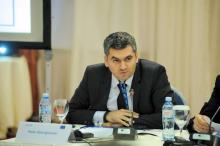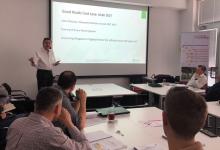The West Balkan countries are at a turning point in their political resolve to address road traffic injuries, but must step up efforts on the ground to deploy sustained and systemic responses to what has become a major public health crisis

Road safety needs to improve in the West Balkans but using experience gained elsewhere in Europe could deliver positive results quickly
The West Balkan countries are at a turning point in their political resolve to address road traffic injuries, but must step up efforts on the ground to deploy sustained and systemic responses to what has become a major public health crisis
This was one of the main findings of the 12th Annual Meeting of Ministers convened by the South East Europe Transport Observatory (SEETO) and the European Commission. Opening the event, European Commissioner Violeta Bulc encouraged the region’s chief transport policymakers to meet average performance levels achieved by European Union member states within five years, equivalent to halving the current rate of traffic injuries. The Commissioner further underscored the essential role of regional collaboration and technical assistance programs in meeting these targets.
Examples of road safety initiatives currently being deployed in the West Balkans include a more systematic use of road safety risk diagnosis tools, access to better crash data, and a renewed focus on mitigating inappropriate driving speed. However, road assessment surveys carried out in the region indicate there remain significant opportunities for life-saving engineering improvements. Keynoting the event, IRF vice chair Thomas Topolski observed that “a startling disconnect exists between safety legislation, design standards, and the actual safety levels experienced by the region’s road users every day”. Targeted, timely, and locally applicable knowledge resources must be provided to project teams throughout the project cycle, he noted, offering the assistance of IRF in overcoming this knowledge gap, and in establishing regionally applicable pathways to becoming certified as a road safety auditor.
“It took up to 30 years for European countries which now have stellar traffic safety records to put in place all the necessary interventions. Your citizens should not have to wait this long”, Topolski concluded.
The Annual Meeting of Ministers included two working lunches organised by3918 IRF Washington and SEETO on the topics of “speed management” and “road project delivery”, both of which served to highlight the role of public private partnerships in overcoming essential road planning and safety challenges.
This was one of the main findings of the 12th Annual Meeting of Ministers convened by the South East Europe Transport Observatory (SEETO) and the European Commission. Opening the event, European Commissioner Violeta Bulc encouraged the region’s chief transport policymakers to meet average performance levels achieved by European Union member states within five years, equivalent to halving the current rate of traffic injuries. The Commissioner further underscored the essential role of regional collaboration and technical assistance programs in meeting these targets.
Examples of road safety initiatives currently being deployed in the West Balkans include a more systematic use of road safety risk diagnosis tools, access to better crash data, and a renewed focus on mitigating inappropriate driving speed. However, road assessment surveys carried out in the region indicate there remain significant opportunities for life-saving engineering improvements. Keynoting the event, IRF vice chair Thomas Topolski observed that “a startling disconnect exists between safety legislation, design standards, and the actual safety levels experienced by the region’s road users every day”. Targeted, timely, and locally applicable knowledge resources must be provided to project teams throughout the project cycle, he noted, offering the assistance of IRF in overcoming this knowledge gap, and in establishing regionally applicable pathways to becoming certified as a road safety auditor.
“It took up to 30 years for European countries which now have stellar traffic safety records to put in place all the necessary interventions. Your citizens should not have to wait this long”, Topolski concluded.
The Annual Meeting of Ministers included two working lunches organised by









